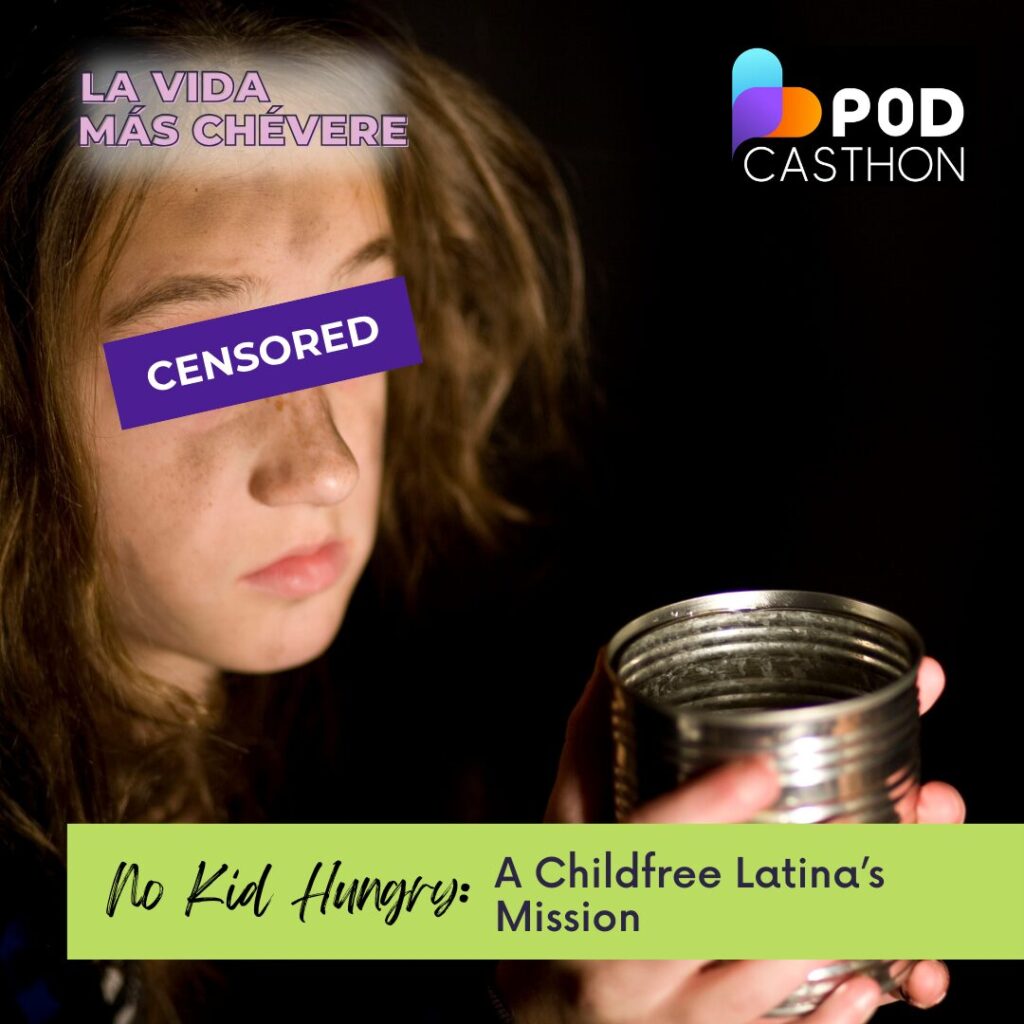Why should a childfree Latina care about starving children? Because empathy is free! And if you’re someone who pays attention, you know that a well-educated public is the foundation of a strong society. But here’s the hard truth: hungry kids struggle to learn.
Listen here:
Or choose your favorite podcast player:
We’re far from being the strong, well-educated society we could be, and that gap is costing us all more than we realize. Just look at what’s going on in this country right now.
Here’s a heartbreaking stat: 14 million children in the U.S. woke up this morning without enough food to eat. Let that sink in. 14 million.
That’s why, as part of the global Podcasthon project highlighting worthy causes, this episode is shining a light on the incredible work No Kid Hungry is doing to fight child hunger across the country.
Want to make a difference? Here’s how you can help:
- Visit No Kid Hungry’s website for resources
- Donate to support their mission
- Volunteer your time and skills locally (mutual aid rocks!)
- Share resources (and this episode!) with your community
No one can design their best life on an empty stomach. Let’s help tomorrow’s adults build their vida más chévere by making sure they’re fed TODAY.

DM me on Instagram if you have questions about this week’s episode. To apply to be on the podcast, fill out this form. And don’t forget to sign up for the LVMC Substack for expanded discussions and behind-the-scenes info on each episode.
If you enjoy what you hear and want to help keep the show ad-free, please support the show!
Also enjoy some limited edition merch, and join the Super Cheveritas so you never miss an episode (or the episode discussions).
This post may contain affiliate links. For more information, please see my Disclosure Policy.*
In this episode
- What Causes Hunger? – Action Against Hunger article
- Child hunger keeps kids from reaching their full potential – Feeding America article
- Podcasthon: a global podcasting project
- No Kid Hungry website
- Five Ways SNAP Helps Kids – No Kid Hungry article
- Hunger vs Food Insecurity – No Kid Hungry article
- Contribution of malnutrition to infant and child deaths in Sub-Saharan Africa and South Asia – NIH National Library of Medicine study
- Revolutionary Self-Care: Black Panthers’ Wellness Legacy ft. Toya Coleman – Be Well Sis podcast
- How the Black Panthers’ Breakfast Program Both Inspired and Threatened the Government – History.com article
- Facts About Child Hunger in America – No Kid Hungry article
Episodes mentioned:
- #69 – Childless Cat Ladies vs Project 2025
- #74 – Why Are We Voting Against Our Best Interests? Angela Chavez on Manipulation and Political Power
Additional reading
Want more discussion on this topic? Check out these complementary blog posts by joining the Super Cheveritas, or read them directly on Substack. It’s like if a blog and a newsletter had a baby, but it’s childfree!🤩
- coming soon
Transcript created with Descript. Learn more.
Transcript
[00:00] Paulette: Buen dia, mi gente, and welcome to La Vida Más Chévere de Childfree Latinas, the only Spanglish podcast for childfree Latinas y Latines, helping us liberate ourselves from the toxic cultural brainwashing we all grew up with so that we can design our best lives instead. I’m your host and resident childfree Latina, Paulette Erato.
[00:25] We are tackling a juggernaut of toxic cultural norms today. Because we’re examining the intersection of issues like poverty, inequity, conflict, climate change, gender discrimination, and weak government and health systems. Because all of these culminate in keeping people hungry, but also devoid of options.
[00:50] The worst is that this affects millions of children. I know you’re thinking, what? Children? Paulette, this isn’t a show for kids or for anyone with kids. True, but you know what? We live in a society and kids are a significant portion of that. And if we don’t take care of one another, and yes, that includes the kids, what the hell is wrong with us?
[01:15] Let me back up. If you listen to a lot of podcasts, this week you might hear about something called Podcasthon. It’s a global project started three years ago in France, where for one week, podcasts all highlight a charity or nonprofit of their choice. This is my first year participating, and I’ve chosen the charity No Kid Hungry because for one, I think it’s sickening that the supposed richest country on earth lets its own citizens starve.
[01:43] And two, despite being ardently and unapologetically childfree, I’ve always advocated for a well-educated populace. But that education starts in childhood, and mis amigues, we are failing on that front. Hungry kids don’t learn well, and we have clearly left too many kids behind, if we’ve elected a king, a dictator, I don’t even know where we are in the timeline anymore.
[02:12] So, I know it seems off brand for a childfree Latina show to focus on making sure that no kid goes hungry. Because kids are the least of my concern. No, I don’t have kids. No, I don’t want kids. And you know what? I’m really tired of seeing kids at places that should be adult-only spaces, like the local breweries.
[02:32] But, a well-educated populace is necessary for a strong society. And guess what? We don’t have that right now. What we do have is hungry kids and a less than stellar society that is rapidly losing the few safety nets we do have. For the last few months, you’ve heard me rage against Project 2025’s plans, which we are watching play out in real time before our very eyes.
[03:00] No Kid Hungry is pushing back on the dismantling of programs like SNAP, which is the Supplemental Nutrition Assistance Program. One in five children, that’s 20 percent of all the kids in this country, participate in this program. I had no idea it was so widespread. Did you know? Because it doesn’t appear that our Congress knows about that either, since they’re considering massive cuts to the program in order to balance their budget. A budget, which includes all kinds of pork barrel BS, like government contracts to the guy whose rockets keep exploding.
[03:40] A society that doesn’t take care of its most vulnerable is something we should be ashamed to be a part of. The fact that a charity initiative like No Kid Hungry even has to exist is obscene. But here we are. I firmly believe we need strong and intelligent adults to run society, but adults begin as children and children can’t learn, and they certainly can’t become strong if they don’t eat. It’s that simple.
[04:07] Look, I already pay more in taxes than the average American because I can’t take advantage of things like child tax credits like parents can. But you know what? Those credits help lift people out of poverty. And as we learned in episode 69, those credits are also given to families making up to $400,000.
[04:27] But most Americans are barely scraping by in the paycheck to paycheck cycle, making it necessary for programs like No Kid Hungry to exist. And we’re going to come back to these income numbers in a moment. All of this is wild.
[04:45] So let me hit you with some facts. First, let’s talk about hunger versus food insecurity.
[04:51] According to the No Kid Hungry website, which I’m going to read from, “hunger is not something we can measure. It’s something we experience. Instead, the U. S. Department of Agriculture, USDA, measures food insecurity. Households that are food insecure are those that struggle to provide enough food for everyone living there at some point during the year.
[05:12] A child living in a food insecure household might not get enough food to eat, or her mother might have to skip meals to feed her, or the family may have enough to eat one month, but not the next. In all these cases, that child is living with hunger. Data about childhood hunger is released annually by the USDA.
[05:35] If you read the latest figures, you’ll see that nearly 14 million children are facing hunger in the United States today.” Today, 14 million! That’s appalling. 14 million children woke up this morning and are wondering, am I going to be able to eat today? Will I be able to eat enough today? And that’s through no fault of their own.
[06:03] They’re just kids. But wait, it gets worse. Again, reading from the No Kid Hungry website, “the number of children living with hunger had fallen steadily over the past decade, but the Corona virus pandemic dealt a terrible blow to our progress as a nation. One that No Kid Hungry and other organizations will work to reverse during the long recovery ahead.”
[06:29] So, they know how to fight this, they’ve been doing it successfully up until now. To continue from their website, “as you might imagine, hunger is a problem that most often affects children from low income families. A common way we measure poverty is the federal poverty level, a number that is set by the U. S. Department of Health and Human Services.
[06:50] The federal poverty level is the minimum amount of money a family needs each year to afford the basic necessities of life. Food, clothing, shelter, and transportation. In 2023, the federal poverty level was $30,900 for a family of four. So how many Americans live in poverty?
[07:12] 43 million people, or 13 percent of all Americans. And according to the 2023 Census Bureau data, 10 million of those are children.” Here’s another really depressing statistic around 45 percent of deaths among children under five years of age are linked to under nutrition. That makes my heart hurt. Here’s some more data based on the 2023 numbers.
[07:45] 18 percent of households with children couldn’t afford to buy enough for the whole family. Coming back to family income. We now know that the federal poverty level is set at $30,900, right? And yet 33 percent of food insecure households had incomes at or above 185 percent of that number, which hovers just under $60,000.
[08:10] So 33 percent of food insecure households make or above $60,000. That salary is considered middle class. Your own neighbors might be one of these families. Here’s more facts. Of course, food insecurity is even higher in single parent households. My own father experienced this when it was just him and my older brother.
[08:36] He routinely went without food so my brother could eat. This was all before I was born, but I’ve heard the stories. I’ve seen the pictures of how skinny my dad was. And don’t worry, my brother is doing great now. In fact, he’s the most successful of all three of his siblings, but that’s due to the sacrifices our parents had to make.
[08:56] This was interesting. Food insecurity is nearly the same in urban and rural areas at 15 to 16 percent. Food deserts exist in the cities and out in the country, too. And of course, minorities are the most affected demographic, with 23 percent of Black households and 22 percent of Latine households affected, as opposed to 10 percent of white households. This is all so heartbreaking.
[09:23] So how does No Kid Hungry work and what do they actually do? From their site, “No Kid Hungry is a national campaign run by Share Our Strength, a nonprofit working to solve problems of hunger and poverty in the United States and around the world.
[09:39] After 25 years of successfully investing in local nonprofits and helping find the best approaches to eradicating poverty and hunger, Share Our Strength launched No Kid Hungry in 2010. As a child hunger organization, ending childhood hunger is our primary focus.” So No Kid Hungry supports the main federal programs such as SNAP, which I mentioned earlier, but also WIC and the National School Lunch Programs.
[10:04] They also focus their efforts on other critical programs like the School Breakfast Program, National Summer Meals Program, After School Meals Program. See how much of this is centered around schools? But let’s get back to one of those programs that Congress is looking to slash so Elon can have more rocket money to burn.
[10:25] This is also from the No Kid Hungry website, “the Supplemental Nutrition Program, SNAP, sometimes known as food stamps, provides low income families with money to purchase food each month. Why is SNAP so important? SNAP is one of the most effective and efficient federal programs, as well as one of the most responsive, providing additional assistance to needy families during economic downturns.
[10:54] It’s also one of the most needed. 42 million Americans rely on SNAP benefits to buy food each month, according to the USDA. Two thirds of those benefits go to households with children.” But one third goes to households without children. And that could be one of my own listeners.
[11:13] By the way, do you know how the school lunch programs were started?
[11:19] I’m in a podcasting program through the Association of Independence in Radio, or AIR, and my fellow cohort member, Dr. Cassandre Dunbar, turned me on to this fact. On her podcast, Be Well Sis, she recently interviewed Toya Coleman, which I’ll link in the show notes. It is an excellent listen, please do go check it out.
[11:38] And they talked about how the Black Panthers started feeding children breakfast before school. Yeah, in 1969, one of the social outreach programs that the Black Panther Party started was a breakfast program at a church in Oakland. Of course, you know, I fell down the rabbit hole researching this. And here’s what I found.
[11:57] Quote, “at its peak, the Black Panther Party fed thousands of children per day in at least 45 programs,” end quote. This is from an article on the History. com site. But due to nasty politics and racism, the FBI under J. Edgar Hoover was given carte blanche to destroy these programs nationwide. This also emboldened local police departments.
[12:21] Police departments, which we learned in episode 74 with Angela Chavez, were born from the Fraternal Order of the Brothers, which back in the day were blatantly used for racist purposes. The PD in Chicago went so far as destroying food and urinating on it, in at least one known instance. Disgusting doesn’t even begin to cover it.
[12:45] The government would rather have seen children starve and struggle because it kept whites at the top of the supremacy pyramid. Sound familiar? The USDA was also running food programs around the same time, but their efforts didn’t take off until the Black Panther’s efforts were ending. And in 1975, according to History. com, the school breakfast program was permanently authorized. And that brings us back to the No Kid Hungry campaign.
[13:14] So, maybe you’re asking yourself, what can I do to make a difference? The good news is there’s several ways. First and foremost, you can donate directly to No Kid Hungry. Of course, there’s going to be a link in the show notes. Your contribution, whether it’s five bucks or 50, it can all make a real impact because that money goes directly to ensuring that a child has food that they need and the chance to succeed.
[13:40] Yay. But donations are not the only way to help. You can share the free resources that No Kid Hungry has on their website with people who may need them. You can volunteer at food banks or community centers, community mutual aid! This is what we saw at the height of the wildfires, people taking care of each other.
[14:03] You can also support campaigns that fight for policies that protect children’s welfare. Every action, no matter how small, contributes to creating a better world for these people who are going to become adults. All of us can ensure that a child has access to nutritious meals, a strong education, and a chance to grow into their full potential as a smart, well-adapted, fulfilled, and thriving adult.
[14:32] Because remember, an educated child becomes an educated adult less likely to be brainwashed by the toxic cultural norms we’ve all grown up in. Just like you, and me. Which is something we should all want. That’s why we’re here. And that’s also why No Kid Hungry is here. So I hope you’ll check them out. And if you’re curious about Podcasthon, I’ll also leave a link in the show notes for that, so you can discover all the other shows that are dedicating some of their resources to worthy causes this week.
[15:05] And that, mis amigas, is a burrito.
[15:09] Hey, mira. If this episode made you feel some kind of way, dígame. DM me on Instagram or send me a text, you can do that right from your phone. If you wanna be a guest on the show and put your story out there too, check out the guest form on my website at pauletteerato.com/guest.
[15:28] Yep. Just my name, pauletteerato.com/guest. Y no se te olvide que hay más perks when when you join the newsletter. Todos estos links están en los show notes. Muchísimas gracias for your support, y hasta la próxima vez, cuídate bien.


